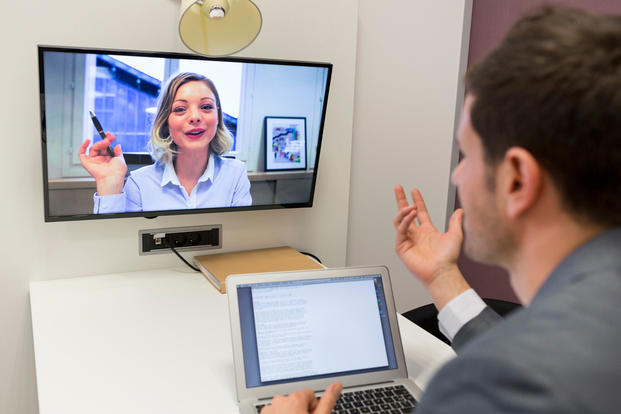As you enter the civilian hiring process, it is likely you will pass through several rounds of interviews. Some interviews will be in person; others might be by phone and/or video. Video interviews give you several advantages over phone interviews -- you can see body language, hear tone of voice and see who is speaking to you -- but there are tricks to navigating the video job interview successfully.
Why Are Video Interviews Popular?
Many companies incorporate video interviews in their hiring process. Some of the reasons employers do video interviews include:
- When a company wants remote employees to interview the candidate, and it's not possible to do so in person.
- Video interviews are a less expensive way to interview candidates who aren't in the local area.
- For companies that need to interview several candidates, back to back, video interviews can be effective and efficient.
- Video interviews offer the opportunity to connect and relate to the candidate, in ways that a phone call or resume can't.
- Often, a video interview is easier for the candidates. As this article notes: "With video interviews, applicants don't need to travel and take a day off so [they] won't miss out on the first-round interview due scheduling problems or costs."
Tips for a Successful Video Interview
A video job interview might feel intimidating or unfamiliar to you, particularly because you didn't have to do them when you were in the military. Today's job seeker knows to expect in person, phone and video interviews as part of the hiring process.
To ensure you manage the interview successfully, remember to:
- Download and understand the video software in advance of the call. Not all platforms are the same. Whether the employer uses Skype, GoToMeeting, Zoom, Google Hangouts or another platform, it is important to make sure your computer settings are compatible, updated and have loaded the software. If possible, hold a practice "trial run" by doing a video call with a friend or colleague so you can test sound, video and practice answering questions.
- Remove any distractions near you, such as your cell or home phone ringer, dogs who could start barking, children crying, someone walking into the room and email notifications on your computer.
- Dress as if you were interviewing in person. Even though the interviewers will only see your head and possibly chest, dress professionally from head to toe. This helps you stay in the mindset of the formality of the meeting.
- Evaluate the background of your setting. Remove photos, books or anything that would distract the interviewer, particularly if the items are controversial or possibly offensive.
- Research the company in advance, and then have questions ready for the interviewers. Review your questions ahead of time so you don't have to read them cold. It's OK to look at your notes when doing the interview, but you don't want to be reading them with the interviewers watching you.
- Smile and look at the camera, not the monitor. It will be hard not to look at the monitor's screen, where you see the faces of who's speaking to you, but try to look into the camera's eye, since that will show on their screen as good eye contact.
- Pause before answering. Consider that there might be a short time lag in the video, and you don't want it to appear as if you are interrupting or talking over the interviewers.
While the video interview might feel awkward, remind yourself that this is a common step in the job interview process. For civilian hiring managers, it is important to have a sense of who you are and how you express passion for the job. A video interview can accomplish this goal.
Want to Know More About the Military?
Be sure to get the latest news about the U.S. military, as well as critical info about how to join and all the benefits of service. Subscribe to Military.com and receive customized updates delivered straight to your inbox.












